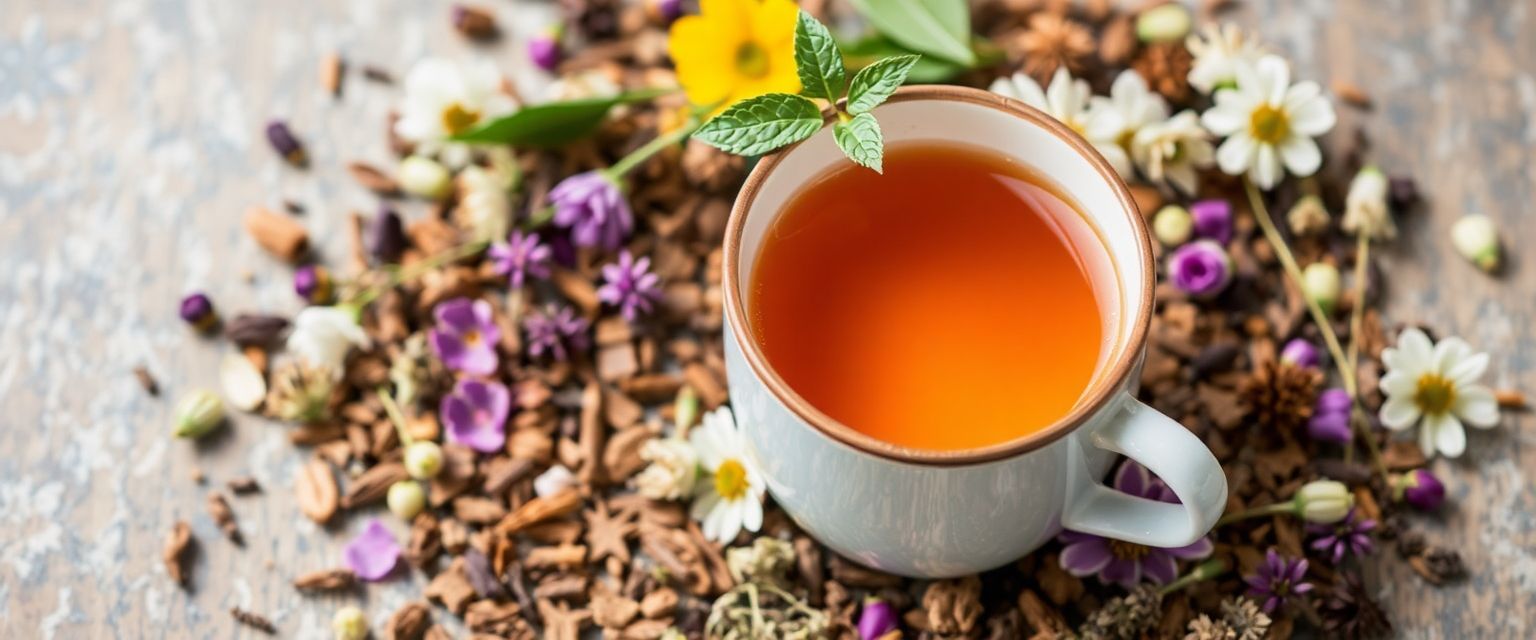Hormonal imbalances can significantly impact our overall health and well-being. From mood swings to weight fluctuations, the effects of unbalanced hormones can be far-reaching.
While there are various approaches to addressing these issues, one of the gentlest and most accessible methods is through the use of herbal teas.
Let’s explore how these natural remedies can help restore hormonal equilibrium and improve your quality of life.
Understanding Hormonal Balance
Our endocrine system is a complex network of glands that produce and secrete hormones. These chemical messengers regulate many bodily functions, including metabolism, growth, mood, sexual function, and reproduction.
When our hormones are in balance, our bodies function optimally.
However, factors such as stress, poor diet, environmental toxins, and certain medical conditions can disrupt this delicate balance, leading to a host of symptoms and health issues.
The Role of Hormones in Our Body
Hormones play crucial roles in various aspects of our health:
- Metabolism: Hormones like insulin, thyroid hormones, and cortisol regulate how our bodies use and store energy.
- Growth and Development: Growth hormone and sex hormones are essential for physical development and maturation.
- Mood and Cognition: Serotonin, dopamine, and cortisol influence our emotional state and cognitive functions.
- Reproductive Health: Estrogen, progesterone, and testosterone are key players in sexual function and fertility.
- Sleep-Wake Cycle: Melatonin regulates our circadian rhythm, affecting sleep patterns and overall health.
When these hormones become imbalanced, it can lead to a wide range of symptoms and health issues, including:
- Fatigue
- Weight gain or loss
- Mood swings
- Irregular menstrual cycles
- Infertility
- Sleep disturbances
- Skin problems
- Digestive issues
The Science Behind Herbal Teas and Hormonal Balance
Herbal teas have been used for centuries in traditional medicine systems worldwide to address various health concerns, including hormonal imbalances. Modern scientific research is now providing evidence for the effectiveness of many of these herbs.
Phytoestrogens: Nature’s Hormone Helpers
Many herbs used in teas contain phytoestrogens, plant compounds that can mimic the effects of estrogen in the body. These can be particularly helpful for women experiencing estrogen deficiency during menopause.
Phytoestrogens can bind to estrogen receptors in the body, potentially alleviating symptoms like hot flashes and mood swings.
Adaptogens: Stress-Busting Herbs
Some herbs are classified as adaptogens, which help the body adapt to stress and regulate cortisol levels. By managing stress more effectively, these herbs indirectly support overall hormonal balance.
Chronic stress can wreak havoc on our endocrine system, so addressing this factor is crucial for maintaining hormonal health.
Liver Support: Clearing the Way for Hormone Balance
The liver plays a crucial role in hormone metabolism and detoxification. Some herbs support liver function, helping to maintain hormonal equilibrium by ensuring proper hormone breakdown and elimination.
A healthy liver can more effectively process and eliminate excess hormones, preventing their accumulation in the body.
Key Teas for Hormonal Balance
Now, let’s explore some of the most effective teas for promoting hormonal balance:
1. Chasteberry Tea
Chasteberry, also known as Vitex, has been used for centuries to support women’s reproductive health. It’s particularly effective in balancing progesterone levels and can help reduce symptoms of PMS and PCOS.
Research suggests that chasteberry works by influencing the pituitary gland, which regulates the production of several key hormones. It may help normalize the ratio of estrogen to progesterone, which is crucial for menstrual regularity and overall hormonal balance.
To prepare chasteberry tea, steep 1 teaspoon of dried chasteberry in 1 cup of hot water for 10-15 minutes. Drink one cup daily, preferably in the morning.
Recommended Product:
Wildfield herbs Chasteberry Tea – This tea has an ideal balance of taste, high standard of quality and aroma. These Chaste Tree Berry Tea have been grown, carefully harvested, specially dried and specially packaged to ensure that they reach the customer in the freshest and most fragrant condition.
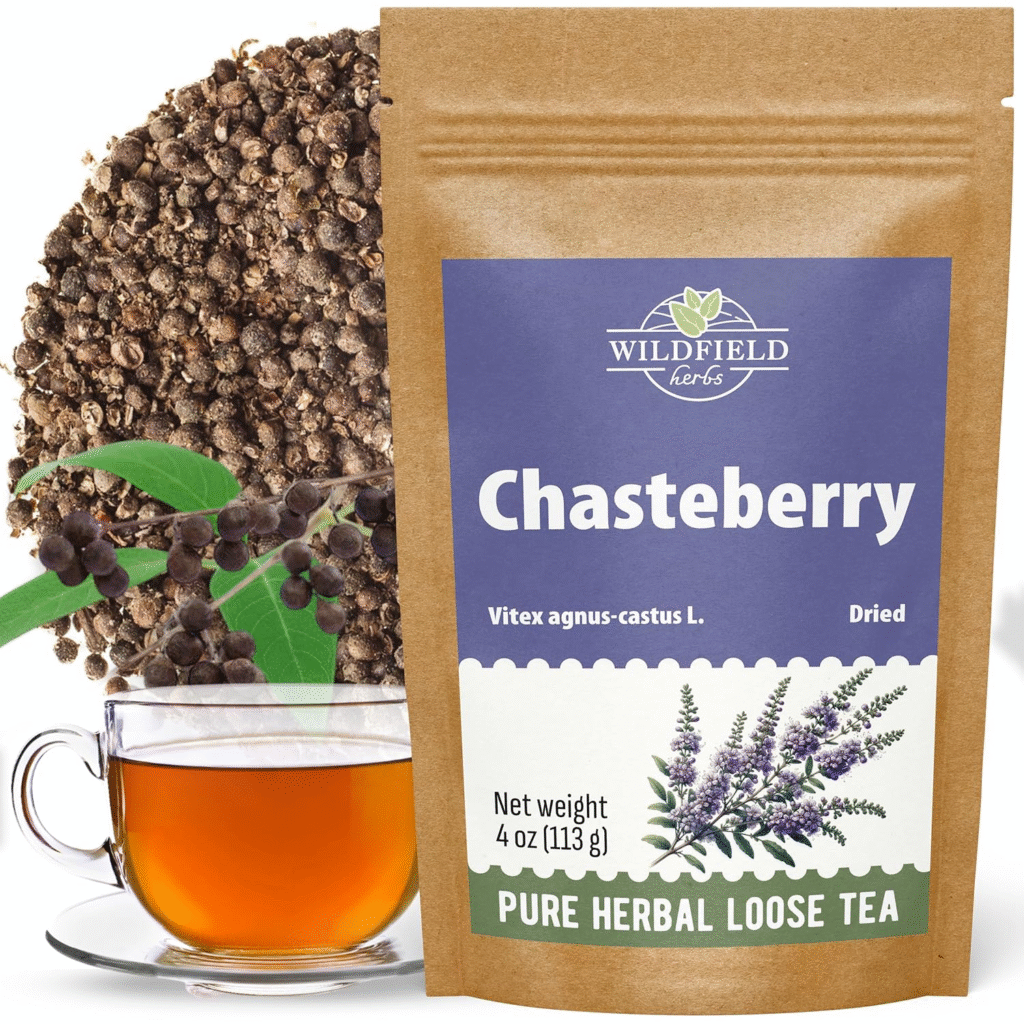
2. Red Clover Tea
Red clover is rich in isoflavones, a type of phytoestrogen. These compounds can help ease menopausal symptoms like hot flashes and night sweats.
Additionally, red clover may support bone health, which is often a concern for postmenopausal women because of declining estrogen levels.
Studies have shown that red clover can increase bone mineral density and improve cardiovascular health in menopausal women. Its estrogenic effects are milder than synthetic hormone replacement therapy, making it a gentler option for many women.
To make red clover tea, steep 1-2 teaspoons of dried red clover blossoms in 1 cup of hot water for 10-15 minutes. Enjoy 2-3 cups daily.
Recommended Product:
Organic Red Clover Tea – This is caffeine free, certified organic and free of any additives and flavoring. This tea has no artificial sweeteners and is only made with natural ingredients.
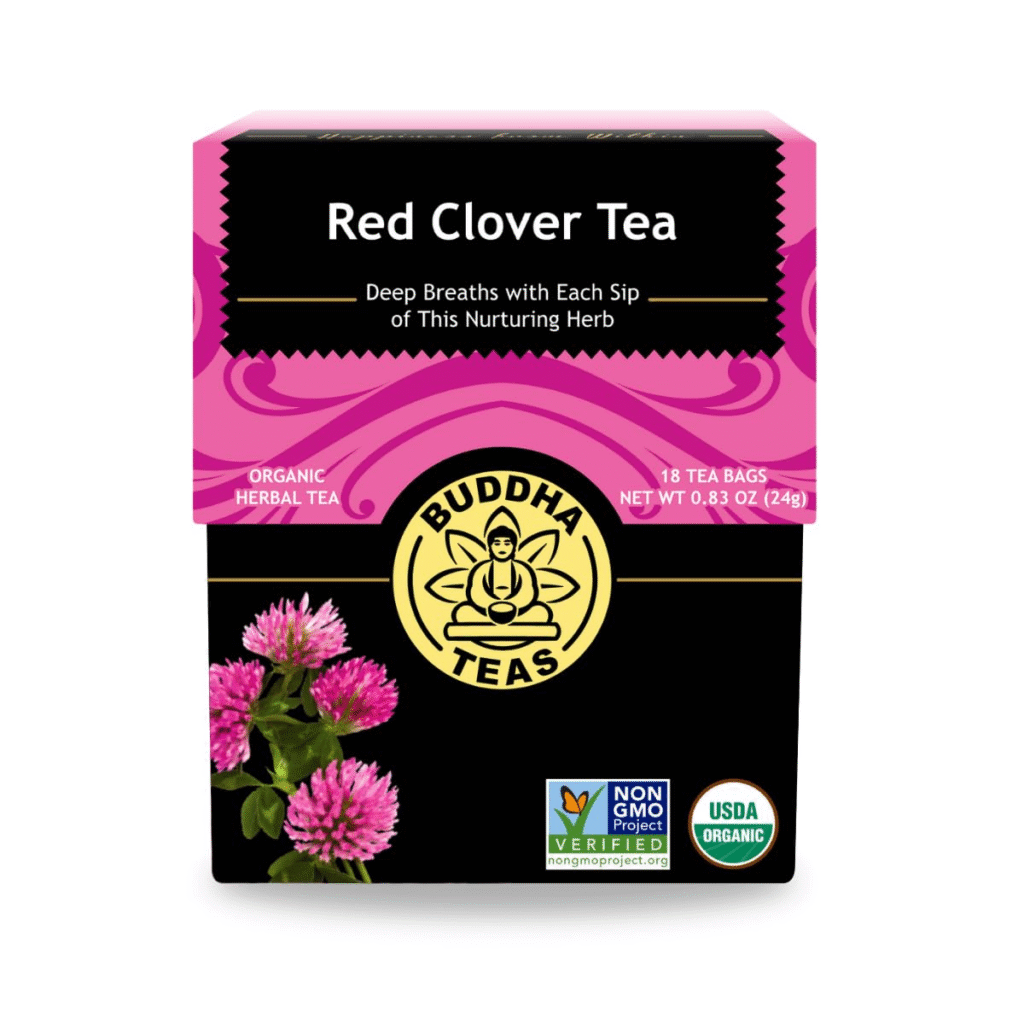
3. Spearmint Tea
Spearmint tea has shown promise in managing hormonal acne and hirsutism (excessive hair growth) in women with PCOS. Studies show that spearmint tea can have an anti-androgenic effect, helping to lower levels of male hormones like testosterone in women.
A study published in the journal Phytotherapy Research found that women with PCOS who drank spearmint tea twice a day for 30 days had significantly lower testosterone levels and improved hirsutism scores.
To prepare spearmint tea, steep 1-2 teaspoons of dried spearmint leaves in 1 cup of hot water for 5-10 minutes. Drink 2 cups daily for best results.
Recommended Product:
FGO Organic Spearmint Leaf Tea – This tea is filled into tea bags and packed into foil-lined craft bags in California. These are constructed of Abacá Hemp Fiber Paper. They are free of dyes, adhesive, glue and chlorine bleach. No staples, strings, bags or extra waste – just delicious tea!
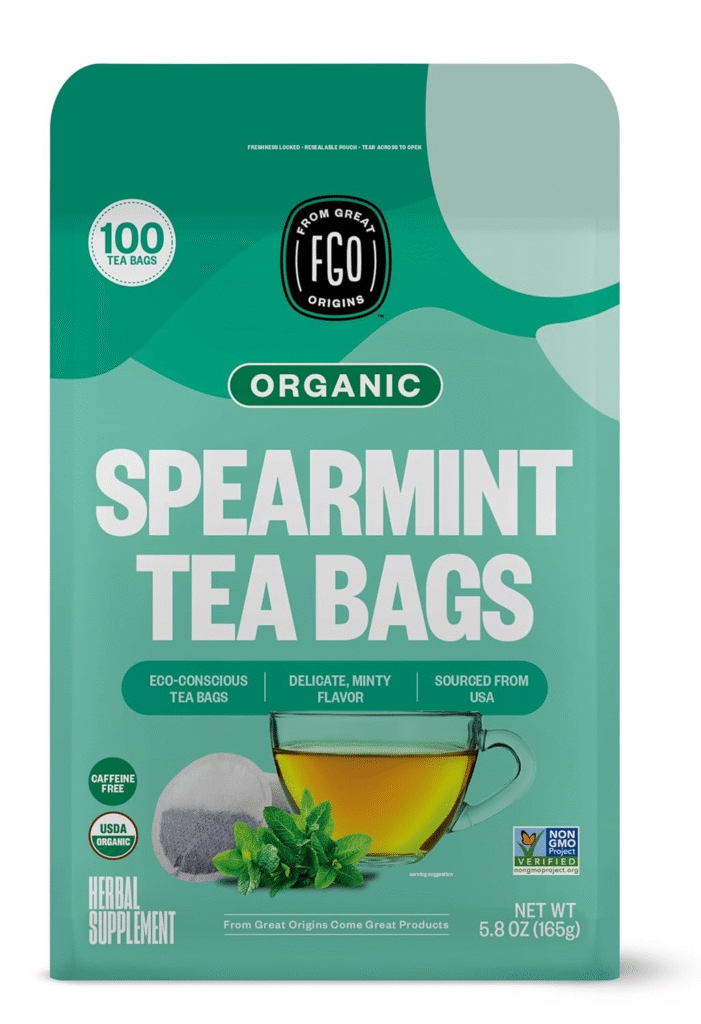
4. Licorice Root Tea
Licorice root contains compounds that can help manage cortisol levels, making it an excellent choice for those dealing with stress-related hormonal imbalances. It’s also been shown to have estrogenic effects and may help with menopausal symptoms.
Licorice root contains a compound called glycyrrhizin, which can inhibit the breakdown of cortisol in the body. This can be useful for people with adrenal fatigue or low cortisol levels.
However, licorice root can affect blood pressure, so it should be used with caution and under the guidance of a healthcare provider.
To make licorice root tea, steep 1 teaspoon of dried licorice root in 1 cup of hot water for 5-10 minutes. Limit consumption to 1 cup per day and avoid using for more than 4-6 weeks without a break.
Recommended Product:
WT WEETEE Organic Licorice Root Tea Bags – Licorice tea contains its unique blend of organic compounds , including glycosides, flavonoids, anethole, antioxidants, minerals and vitamins(Up to three cups a day). Each bag of tea is made from premium licorice root, which is carefully ground to release the natural sweetness of licorice root faster. Fresh herbs and tea leaves are important for experiencing the true taste of tea.
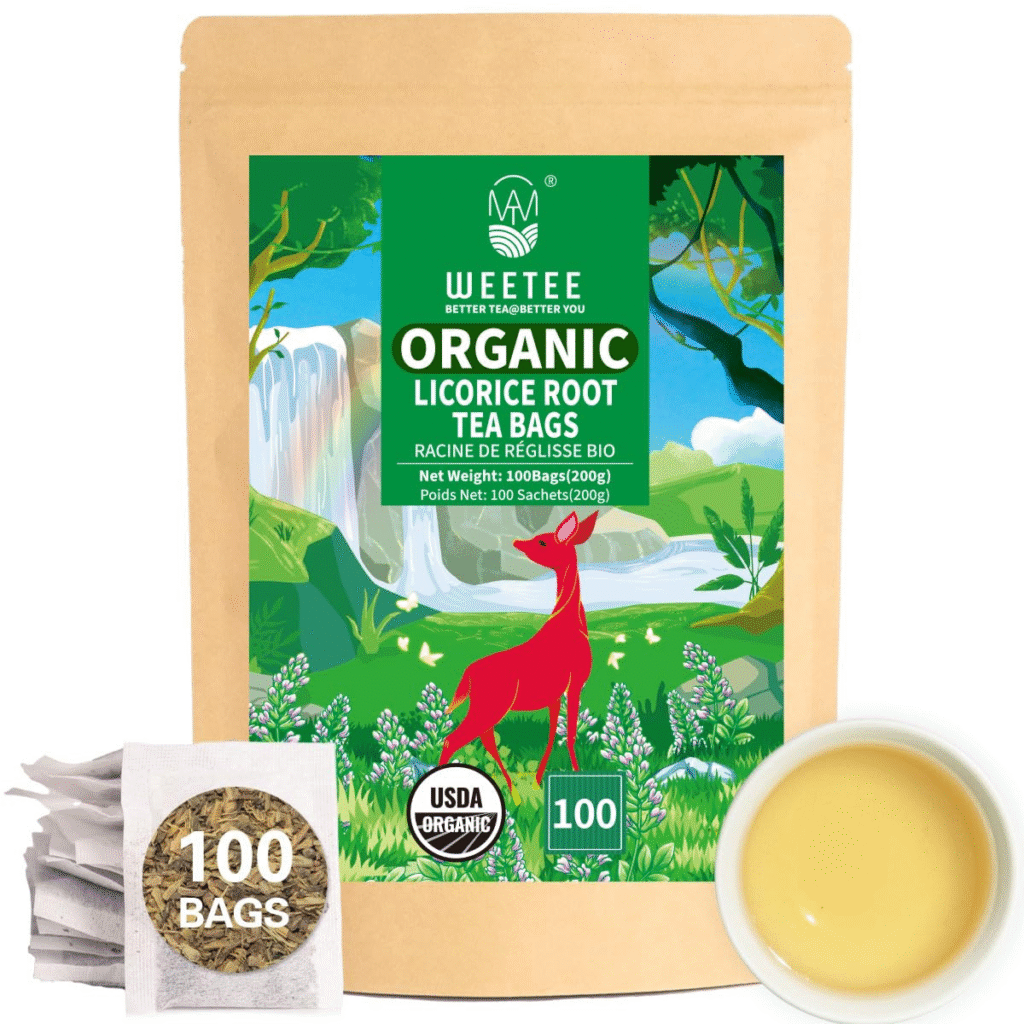
5. Ashwagandha Tea
As an adaptogenic herb, ashwagandha helps the body manage stress more effectively. By regulating cortisol levels, it can indirectly support overall hormonal balance.
Some studies also suggest that ashwagandha may help boost testosterone levels in men.
Ashwagandha has been shown to reduce cortisol levels and improve symptoms of stress and anxiety. It may also help improve thyroid function, which is crucial for maintaining overall hormonal balance.
To prepare ashwagandha tea, simmer 1 teaspoon of ashwagandha root powder in 1 cup of water for 10 minutes. Strain and add honey or lemon to taste.
Drink 1 cup daily, preferably in the evening.
Recommended Product:
Tempoak Ashwagandha Root Tea – Ashwagandha tea is a great source of antioxidants, rich in iron and other minerals, and made from one of the most revered herbs in India. The ingredients in this tea help support energy during the day, while also helping you get a good night’s sleep. This tea has an earthy, somewhat pungent, slightly creamy taste sensation to your cup. Honey or maple syrup are a great way to add sweetness.
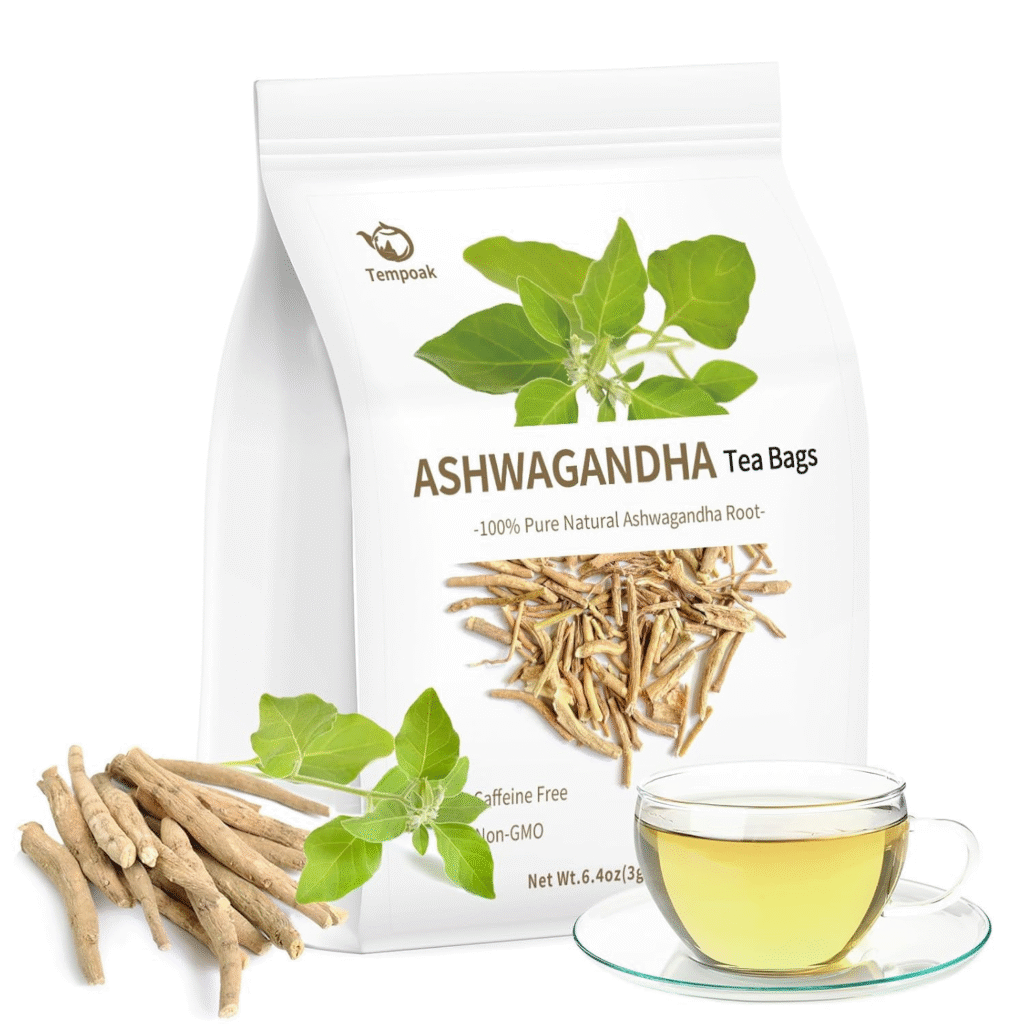
6. Raspberry Leaf Tea
Raspberry leaf tea is often recommended for women’s health, particularly during pregnancy and for menstrual support. It contains fragarine, a compound that may help tone the uterine muscles and regulate menstrual flow.
This tea is rich in vitamins and minerals, including iron, calcium, and magnesium, which are important for overall hormonal health. Some women find that regular consumption of raspberry leaf tea helps reduce menstrual cramps and regulate their cycles.
To make raspberry leaf tea, steep 1-2 teaspoons of dried raspberry leaves in 1 cup of hot water for 10 minutes. Drink 1-3 cups daily.
Recommended Product:
Buddha Teas Organic Raspberry Leaf Tea – This tea best extracts in water with temperatures of 205°-212° F. Allow the tea to steep for 3-6 minutes for a full, flavorful cup. High quality, fresh herbs and tea leaves are important for experiencing the true taste of tea. Buddha Teas crafts all teas from fresh, organic or wild harvested plants that have been gathered and packaged with conscious care.
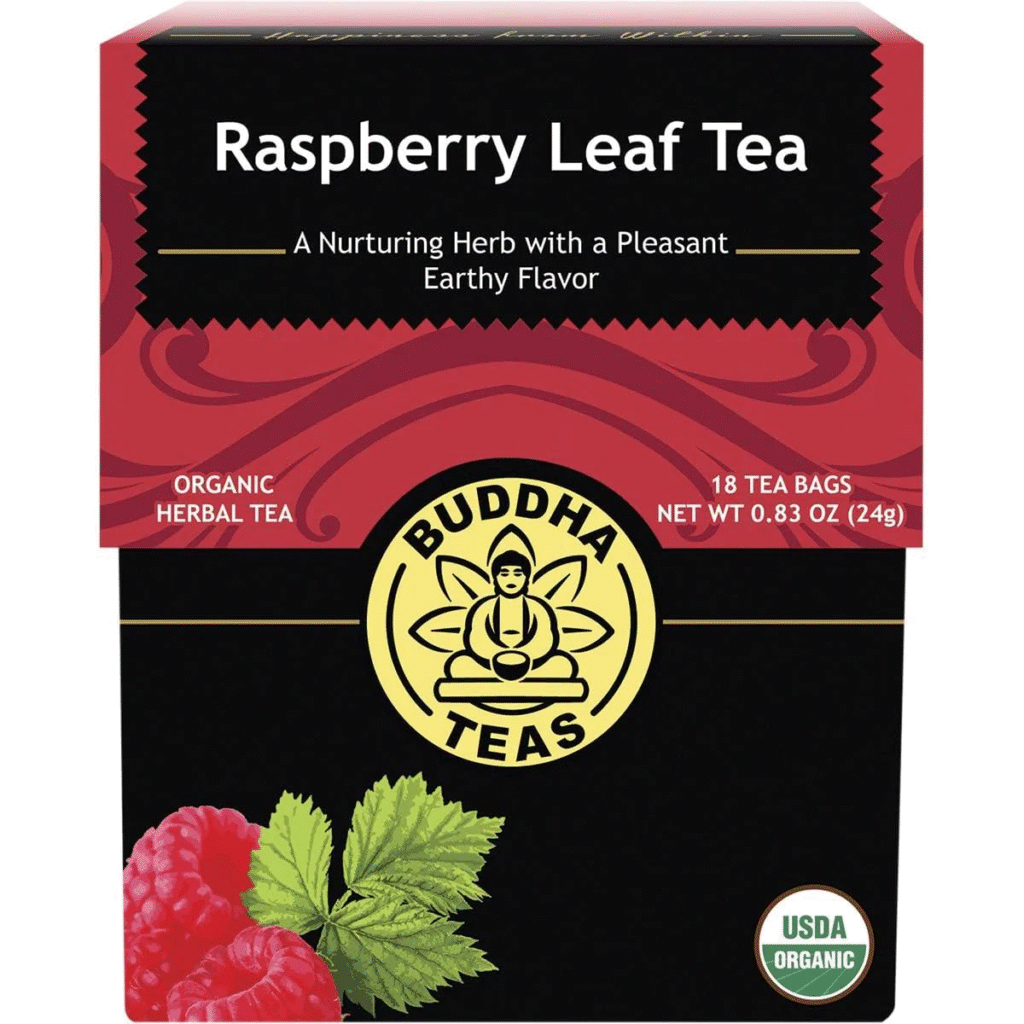
7. Green Tea
While not specifically an herbal tea, green tea deserves mention for its potential hormonal benefits. It contains a compound called epigallocatechin gallate (EGCG), which has been shown to have anti-estrogenic effects and may help balance hormone levels.
Green tea is also rich in antioxidants, which can help protect the body from oxidative stress and inflammation, both of which can contribute to hormonal imbalances. Additionally, the L-theanine in green tea can help reduce stress and promote relaxation without causing drowsiness.
To prepare green tea, steep 1 teaspoon of loose green tea leaves or 1 tea bag in 1 cup of hot water (not boiling) for 2-3 minutes. Enjoy 1-3 cups daily, preferably between meals.
Recommended Product:
FGO Organic Green Tea – The tea is sourced from China, then blended, filled into tea bags and packed in resealable bags in California. These premium tea bags are constructed of Abacá Hemp Fiber Paper. They are free of dyes, adhesive, glue and chlorine bleach. No staples, strings, bags or extra waste – just delicious tea!
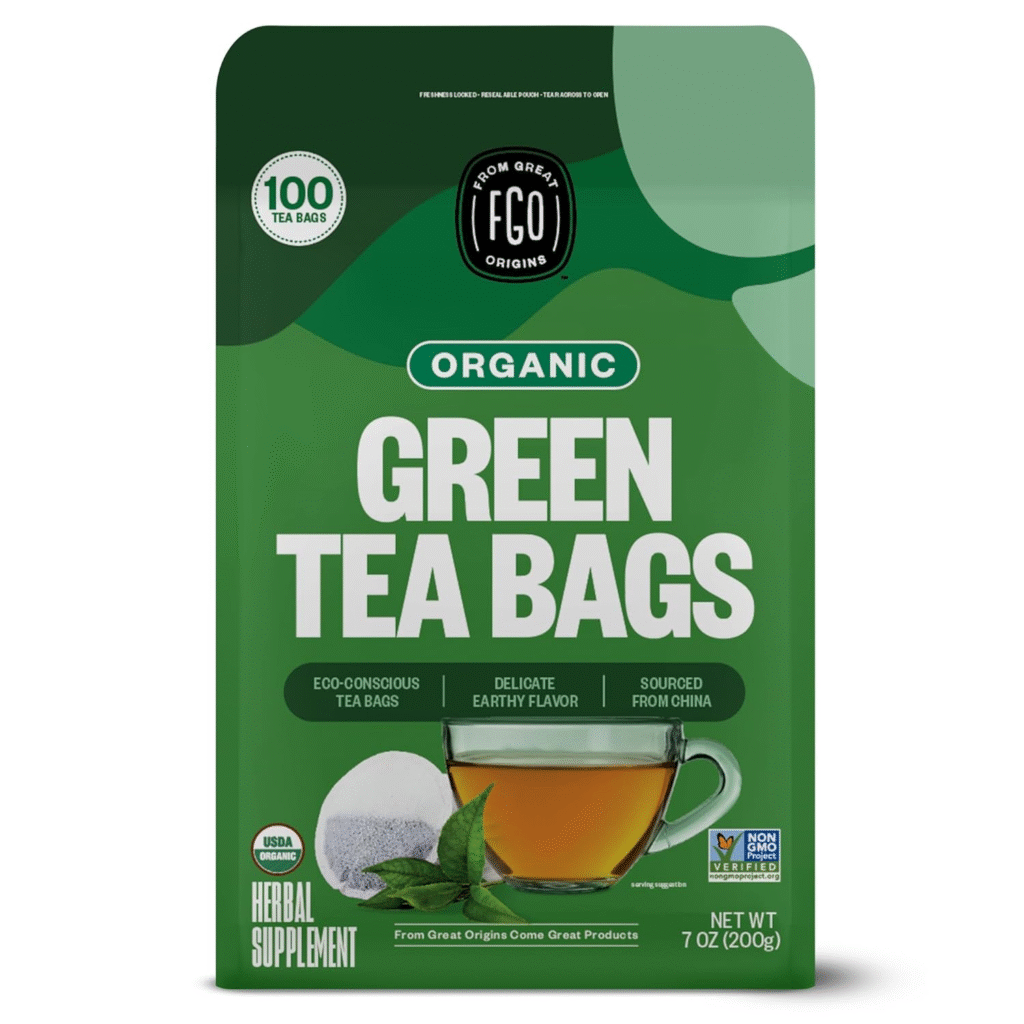
Crafting Your Hormone-Balancing Tea Routine
While these teas can be powerful allies in your progress towards hormonal balance, it’s essential to approach their use thoughtfully. Here are some tips for incorporating hormone-balancing teas into your routine:
Start Slowly and Observe
Introduce one new tea at a time and observe how your body responds. Keep a journal to track any changes in symptoms or overall well-being.
This will help you identify which teas are most effective for your person needs.
Be Consistent
Hormonal balance takes time to achieve. Aim to drink your chosen tea regularly for at least a few weeks to see effects.
Consistency is key when it comes to herbal remedies, as their effects are often added.
Consider Timing
Some teas, like those containing caffeine (such as green tea), are best consumed earlier in the day to avoid interfering with sleep. Others, like chamomile or ashwagandha, can be perfect for evening relaxation.
Pay attention to how different teas affect your energy levels and sleep patterns.
Choose Quality
Opt for high-quality, organic teas whenever possible to avoid potential contaminants that could disrupt hormonal balance. Look for reputable brands that source their herbs responsibly and provide information about their quality control processes.
Create Synergistic Blends
Consider creating your own tea blends to address many aspects of hormonal health simultaneously. For example, you might mix chasteberry for progesterone support with ashwagandha for stress reduction.
Experiment with different combinations to find what works best for you.
Rotate Your Teas
To prevent your body from becoming too accustomed to any one herb, consider rotating your teas throughout the week. This can also help you reap the benefits of a wider range of herbs and prevent potential side effects from long-term use of a single herb.
The Path to Hormonal Balance
Achieving hormonal balance is an ongoing process that needs patience, self-awareness, and often, a bit of trial and error. Pay attention to how your body responds to different teas and lifestyle changes.
Keep a journal to track your symptoms and any improvements you notice.
As you set off on this path, be kind to yourself. Hormonal imbalances can be frustrating, but with time and the right approach, balance is achievable.
Herbal teas offer a gentle, natural way to support your body’s innate wisdom and healing capabilities.
Remember that everyone’s body is different, and what works for one person may not work for another. Be patient with yourself and willing to adjust your approach as needed. With persistence and a holistic approach, you can work towards achieving hormonal balance and improving your overall health and well-being.
People Also Asked
What is the best tea for balancing female hormones?
Chasteberry tea is often considered one of the best options for balancing female hormones, particularly for issues related to PMS and menstrual irregularities.
Can green tea help balance hormones?
Yes, green tea contains compounds that may help balance hormones by reducing inflammation and supporting liver function.
How long does it take for herbal teas to balance hormones?
It typically takes 4-6 weeks of consistent use to start noticing the effects of herbal teas on hormonal balance.
Is chamomile tea good for hormone balance?
Chamomile tea can help support hormone balance indirectly by reducing stress and promoting better sleep.
Can drinking tea increase estrogen levels?
Some teas, particularly those containing phytoestrogens like red clover, may have mild estrogenic effects in the body.
Is peppermint tea good for hormonal imbalance?
Peppermint tea can help with symptoms of hormonal imbalance, such as bloating and digestive discomfort, but it doesn’t directly balance hormones.
Does ashwagandha tea balance hormones?
Ashwagandha tea is known for its adaptogenic properties, which can help balance cortisol levels and indirectly support overall hormonal health.
Can herbal teas help with menopause symptoms?
Many herbal teas, such as red clover and black cohosh, are used to help reduce menopause symptoms like hot flashes and mood swings.
Is there a tea that can help with PCOS symptoms?
Spearmint tea has shown promise in helping manage symptoms of PCOS, particularly in reducing excess androgen levels.
How much tea should I drink daily for hormone balance?
The recommended amount varies depending on the specific tea and your person needs, but generally, 1-3 cups per day is a common suggestion for most herbal teas.
Key Takeaways
- Herbal teas can be powerful allies in achieving hormonal balance.
- Key teas include chasteberry, red clover, spearmint, licorice root, and ashwagandha.
- Consistency and quality are crucial when using teas for hormonal health.
- Always talk to a healthcare provider before starting a new herbal regimen.
- Combine tea consumption with a holistic lifestyle approach for best results.
- Be patient and attentive to your body’s responses as you work towards hormonal balance.
Disclaimer
The information contained in this post is for general information purposes only. The information is provided by Teas for Hormonal Balance: A Guide and while we endeavor to keep the information up to date and correct, we make no representations or warranties of any kind, express or implied, about the completeness, accuracy, reliability, suitability or availability with respect to the website or the information, products, services, or related graphics contained on the post for any purpose.

